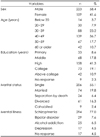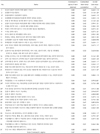Abstract
Objectives
The purpose of this study was to develop and validate the indicator of human rights of people with mental illness (HRPM).
Methods
The HRPM scale was administered to 382 inpatients at national hospital psychiatric (schizophrenia 77.0%, bipolar disorder 7.6%). Reliability of HRPM was tested by internal consistency, test-retest reliability, and item-total correlation. Domains and contents were examined for assessment of construct validity of HRPM.
Results
Human rights of people with mental illness was highly reliable in terms of internal consistency (Cronbach alpha=0.87), test-retest reliability (r=0.81), and corrected item-total correlation r range from 0.42 to 0.71. In addition, construct validity of HRPM was established with the domains and contents in conceptually expected ways.
References
1. United Nations. Universal Declaration of Human Rights. Paris: UN;1948.
2. Mental Health Act. Korea. updated 2010. Available from: http://www.law.go.kr.
3. Cho MJ. Epidemiological survey of mental illness. Seoul: Seoul National University College of Medicine;2011.
4. National Human Right Commission of Korea. National Human Right Commission of Korea Report 2008: Change of mental health paradigm for the protection and improvement of human rights of persons with mental illness. Seoul: NHRCK;2008.
5. Kang ST, Kim JS, Park JH. Research project for developing the indicators of human rights in the university. Seoul: National Human Right Commission of Korea;2009.
6. Shin YJ. Change of mental health paradigm for the protection and improvement of human rights of persons with mental illness. Seoul: National Human Right Commission of Korea;2008.
7. World Psychiatric Association. The Declaration of Hawaii. New York: WPA;1977.
8. World Psychiatric Association. Statement and Viewpoints on the Rights and Legal Safeguards of the Mentally ill. In : World Congress; Athens. New York: WPA;1989.
9. United Nations. The Protection of Persons with Mental Illness and the Improvement of Mental Health Care. General Assembly Resolution (A/RES/46/119). 1991. Available from: http://www.un.org/documents/ga/res/46/a46r119.htm.
10. Gostin LO. International human rights law and mental disability. The Hastings Center Report. 2004.
11. Korea Institute for Health and Social Affairs. Research project on the political implications of discrimination and violence allegations of people with disabilities. Seoul: Korea Institute for Health and Social Affairs;2012.
12. Hong JP. Present status and major issues in human rights of people with mental illness: Standard educational text of human rights for mental health facilities. Seoul: Korea Human Resource Development Institute for Health and Welfare;2011.
13. Jeon JN. A study on the efficacy of social indicators for the policy evaluation. Seoul: Yonsei University school of public administration master's thesis;1989.
14. Statistics Korea. Seoul: Social indicators;2008.
15. Land KC. Social indicators. In : Borgatta EF, Borgatta ML, editors. Encyclopedia of Sociology. New York: Macmillan Publishing Co.;1992. p. 1844–1850.
16. Gil EB, Lee YG, Kim YJ. Research project for developing the indicators of human rights of adolescents. Seoul: Korea National Youth Policy Institute;2001.
17. Lee YG, Lee MM, An GS, Jeong GE. A study on the indicators of human rights in the facilities for children welfare. Seoul: National Human Right Commission of Korea Research Project;2005.




 PDF
PDF ePub
ePub Citation
Citation Print
Print






 XML Download
XML Download